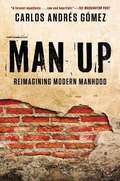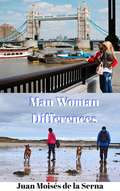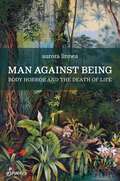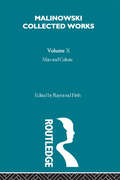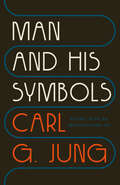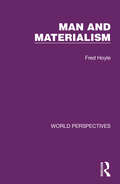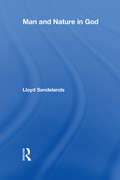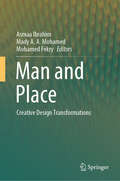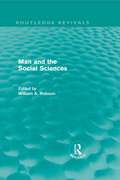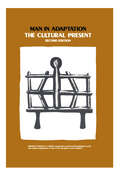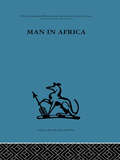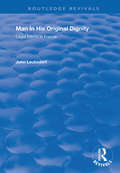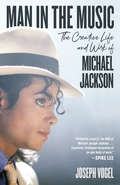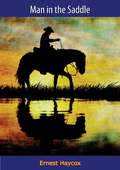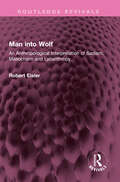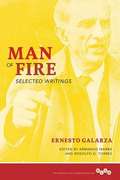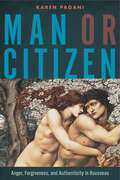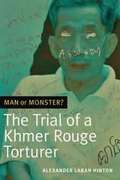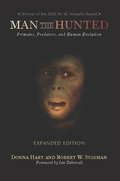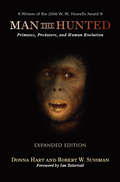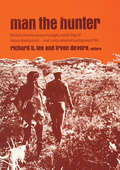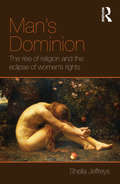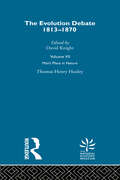- Table View
- List View
Man Up
by Carlos Andres GomezInspired by the award-winning poet and actor’s acclaimed one-man play, a powerful coming-of-age memoir that reimagines masculinity for the twenty-first-century male. Award-winning poet, actor, and writer Carlos Andrés Gómez is a supremely gifted storyteller with a captivating voice whose power resonates equally on the live stage and on the page. In one of his most moving spoken-word poems, Gómez recounts a confrontation he once had after accidentally bumping into another man at a club. Just as they were about to fight, Gómez experienced an unexplainable surge of emotion that made his eyes well up with tears. Everyone at the scene jumped back, as if crying, or showing vulnerability, was the most insane thing that Gómez could possibly have done. Like many men in our society, Gómez grew up believing that he had to be ready to fight at all times, treat women as objects, and close off his emotional self. It wasn’t until he discovered acting that he began to see the true cost of squelching one’s emotions-and how aggression dominates everything that young males are taught. Statistics on graduation rates, employment, and teen and young-adult suicide make it clear that the young males in our society are at a crisis point, but Gómez seeks to reverse these ominous trends by sharing the lessons that he has learned. Like Hill Harper’s Letters to a Young Brother, Man Up will be an agent for positive change, galvanizing men-but also mothers, girlfriends, wives, and sisters-to rethink and reimagine the way all men interact with women, deal with violence, handle fear, and express emotion. .
Man Up: Reimagining Modern Manhood
by Carlos Andres GomezInspired by the award-winning poet and actor's acclaimed one-man play, a powerful coming-of-age memoir that reimagines masculinity for the twenty-first-century male. Award-winning poet, actor, and writer Carlos Andrés Gómez is a supremely gifted storyteller with a captivating voice whose power resonates equally on the live stage and on the page. In one of his most moving spoken-word poems, Gómez recounts a confrontation he once had after accidentally bumping into another man at a club. Just as they were about to fight, Gómez experienced an unexplainable surge of emotion that made his eyes well up with tears. Everyone at the scene jumped back, as if crying, or showing vulnerability, was the most insane thing that Gómez could possibly have done.Like many men in our society, Gómez grew up believing that he had to be ready to fight at all times, treat women as objects, and close off his emotional self. It wasn't until he discovered acting that he began to see the true cost of squelching one's emotions--and how aggression dominates everything that young males are taught.Statistics on graduation rates, employment, and teen and young-adult suicide make it clear that the young males in our society are at a crisis point, but Gómez seeks to reverse these ominous trends by sharing the lessons that he has learned. Like Hill Harper's Letters to a Young Brother, Man Up will be an agent for positive change, galvanizing men--but also mothers, girlfriends, wives, and sisters--to rethink and reimagine the way all men interact with women, deal with violence, handle fear, and express emotion.
Man Woman Differences: Discover The Latest Scientific Findings On The Differences Between Men And Women
by Juan Moises de la Serna Maria Esther Wolburg DomínguezMan Woman Differences by Juan Moises de la Serna Discover the latest scientific findings on the differences between men and women To speak of gender is to speak of differences and similarities between men and women, a controversial aspect because sometimes it is about positioning one over the other. Science on the other hand is blind to these discussions centered on offering data and information about the similarities and differences between man and woman. This text offers the results from the latest investigations made by investigators around the world. Discover the latest that the scientific community has discovered about the differences between man and woman.
Man against Being: Body Horror and the Death of Life
by Aurora LinneaMan Against Being diagnoses the manmade world with a terminal case of somatophobia: fear of the body. Horrified by the facts of the flesh, men have spent the last several millennia on the run from, and at war with, the mortal material reality of the human 'meatsack'. This deep-rooted antagonism towards biological being has given rise to cultures defined by denial and dread, and societies doomed to self-annihilation. Because life on earth is incarnate, men's fantasies of transcendent escape from bodiliness are today proving themselves not only hopeless, but deadly. Tracing the history of somatophobia from Plato's derision of the body as the soul's prison and tomb to the post-embodiment exit strategies of Silicon Valley transhumanists, aurora linnea examines how patriarchal civilization has been shaped from its inception by a morbid disavowal of matter, physicality, and the natural world. She weaves together such disparate sources as monster movies, medieval literature, science fiction, and social psychology to expose body horror as the common thread and theme that creeps darkly along the underside of manmade cultures, the basic pathology that has poisoned men against life itself. And the pains of this pathology are not simply ideological: at the center of the systems of oppression and world-devouring violence men have engineered, the rejected body festers. Seeking an antidote to patriarchal civilization's apocalyptic flight from corporeal, biological reality, Man Against Being charts a return to the flesh and blood of the matter, a vital reintegration of body and mind and living earth. For the path forward out of male dominion, linnea argues, is in fact a homecoming to our truest nature.
Man and Culture: An Evaluation of the Work of Malinowski [1957]
by Bronislaw MalinowskiThis volume is a reassessment of Malinowski's work by a group of his former pupils and colleagues. A frank evaluation, not a eulogy, it examines the real and lasting importance of Malinowski's contribution to a range of subjects.
Man and His Symbols (Picador Bks.)
by Carl Gustav JungIllustrated throughout with revealing images, this is the first and only work in which the world-famous Swiss psychologist explains to the layperson his enormously influential theory of symbolism as revealed in dreams.From the Paperback edition.
Man and Materialism (World Perspectives #10)
by Fred HoyleOriginally published in 1957, this book offers a challenging intellectual experience to the reader who wishes to understand the broad historical trends that determine the future of humanity on this planet. The book examines natural laws that govern humanity by looking at communities over long periods of time and noting patterns which become evident. The book includes discussions of communism, the crisis in food and population growth, the significance of industrialism and man and his religious beliefs – all issues that remain as relevant today as when the book was first published.
Man and Nature in God
by Lloyd E. Sandelands"Contemporary American life is tinged with dissatisfaction. Increased wealth and comfort and technological advances have not made individuals happier or society more companionable. Today Americans marry later or not at all, and they fail at marriage as often as they succeed. Man and Nature in God is a story of contemporary American decadence, a grim tale of our flagging relation to nature, a tale confirmed at the center of our sexual lives. Sandelands grounds his critique in a modern philosophical error. We have conflated a particular metaphysical outlook--the subjective standpoint of science--with our relationship, as humans, to nature. We fail to see that however much we may learn about nature by treating it as object to our subject, we cannot in this way learn what we most want and most need to know about nature and about ourselves. Answers to such questions as ""How are we related to nature?"" and ""How are we to think and act truly in nature"" continue to elude us.Cast as ideology by the ""isms"" of humanism, naturalism, and postmodernism, today's subjective standpoint has turned the question of truth into one question of politics. The unhappy result has been and continues to be a profound and deadly misunderstanding of nature as well as man, epitomized in contemporary American culture today. Taking this as his starting point, Sandelands suggests how we can save ourselves from our mortifying philosophical error, thereby claiming our true relation to nature, and reinvigorating our sexual lives. He identifies the need for a natural philosophy that takes God to be the starting point of self-understanding.Although the book is about philosophy, it is not only for the academic philosopher. Although it is about theology, it is not only for the theologian or student of religion. And although the book takes modern biological and social sciences to task, it is not only for biological and social scientists. Instead, Man and Nature in God is for everyone concerned about the disma"
Man and Place: Creative Design Transformations
by Asmaa Ibrahim Mohamed Fekry Mady A. A. MohamedThis book is a result of the 1st ARCH and DESN International Conference (previously Memaryat) Conference held at Effat university on the 8th and 9th of February 2023, and includes chapters dealing with the critical manifestation of “Man and Place” to accommodate and embrace social, economic, and environmental needs within a balanced, integrated system.The book is groundbreaking in that it brings together some of the brightest minds in academia and industry. The book includes a diverse range of contributions from esteemed academics and practitioners and offers a unique platform for thought-provoking discussions and innovative strategies that will help shape the cities of tomorrow.Further chapters include topics such as sustainability and creative transformations, smart cities, environmental resilience, resilient local economies, manufacturing innovations, and smart products. This book will be of interest to decision-makers, architects, interior designers, product designers, urban planners, urban designers, entrepreneurs, educators, and agencies.
Man and the Social Sciences: Twelve lectures delivered at the London School of Economics and Political Science tracing the development of the social sciences during the present century (Routledge Revivals)
by William A. RobsonOne of the most significant movements in the world of learning in the twentieth century was the rise and development of the social sciences. However, few attempts have been made to see how far social scientists have travelled on the road to studying and understanding human society. First published in 1972, the lectures reprinted in this book aim to trace the development of the social sciences during the twentieth century and to show the role of the London School of Economics and Political Science in this development since it was founded in 1895. Each of the very distinguished lecturers was asked to take the larger view, to be critical where necessary, to treat his subject in the context of the world of learning. The result is a survey of exceptional interest in which the growth of the social sciences is analysed from a number of contrasting viewpoints, each of which ranges widely and often with provocative brilliance over themes that are of general concern. The introduction by Professor W.A. Robson, which was not part of the original lecture series, is in itself a critical assessment of the field that will be read with close attention.
Man in Adaptation: The Cultural Present
by Yehudi A. Cohen William PetersenUnderlying the anthropological study of man is the principle that there is a reality to which man must adapt if he is to survive. Reproduce, and to perpetuate himself. Populations must adapt to the realities of the physical world and maintain a proper "fit" between their biological makeup and the pressures of the various niches of the world in which they seek to live. Social groups-where culture is found-must develop adaptive mechanisms in the organization of their social relations if there is to be order, regularity, and predictability in patterns of cooperation and competition and if they are to survive as viable units. This three-volume set of readings presents an introduction to anthropology that is unified and made systematic by focus on adaptations that have accompanied the evolution of man, from non-human primate to inhabitant of vast urban areas in modern industrial societies. Man in Adaptation: The Cultural Present introduces Cultural Anthropoloty also from the point of view of adaptation and provides coherence for the study of human societies from man's social beginnings to the present. The book deals sequentially with the more and more complex technologies and political and social structures that have enabled different societies to make effective use of the energy potentials in their habitats.This and the two companion volumes are the first attempt to unify the disparate subject matter of anthropology within a single and powerful explanatory framework. They incorporate the work of the most renowned anthropological experts on man, and they illuminate clearly one of the most important concepts around which one can build an investigation of the nature and scope of anthropology itself. For these reasons, they are recognized as indispensable reading for every professional anthropologist and as perhaps the best available means of introducing new students to the field.
Man in Africa
by Mary Douglas Phyllis M KaberryTavistock Press was established as a co-operative venture between the Tavistock Institute and Routledge & Kegan Paul (RKP) in the 1950s to produce a series of major contributions across the social sciences. This volume is part of a 2001 reissue of a selection of those important works which have since gone out of print, or are difficult to locate. Published by Routledge, 112 volumes in total are being brought together under the name The International Behavioural and Social Sciences Library: Classics from the Tavistock Press. Reproduced here in facsimile, this volume was originally published in 1969 and is available individually. The collection is also available in a number of themed mini-sets of between 5 and 13 volumes, or as a complete collection.
Man in His Original Dignity: Legal Ethics in France (Routledge Revivals)
by John LeubsdorfThis title was first published in 2001. This work explores the professional standards of the French bar as it moves, rapidly but with misgivings, into a world of competition, organization and globalism. It focuses on the ideology of French legal ethics in its historical and social contexts, rather than the details of the rules governing avocats. Those rules are technical and, in many respects, similar to the rules in effect in the USA. But lawyers in France and the United States base their rules on strikingly different pictures of lawyers. French avocats classify their duties as a series of virtues - probity, honour and delicacy - to follow one official formulation. By contrast, lawyers in the USA, to judge from the way they justify their rules, consider their fellows scoundrels who, without regulation, would cheat their clients, opposing parties and other lawyers. The author's goal is to describe, in their cultural and institutional contexts, the professional ideals of the French bar as it remembers its past and faces its future.
Man in the Music: The Creative Life And Work Of Michael Jackson
by Joseph VogelFor half a century, Michael Jackson’s music has been an indelible part of our cultural consciousness. Landmark albums such as Off the Wall and Thriller shattered records, broke racial barriers, amassed awards, and set a new standard for popular music. While his songs continue to be played in nearly every corner of the world, however, they have rarely been given serious critical attention. The first book dedicated solely to exploring his creative work, Man in the Music guides us through an unparalleled analysis of Jackson’s recordings, album by album, from his trailblazing work with Quincy Jones to his later collaborations with Teddy Riley, Jimmy Jam, Terry Lewis, and Rodney Jerkins. Drawing on rare archival material and on dozens of original interviews with the collaborators, engineers, producers, and songwriters who helped bring the artist’s music into the world, Jackson expert and acclaimed cultural critic Joseph Vogel reveals the inspirations, demos, studio sessions, technological advances, setbacks and breakthroughs, failures and triumphs, that gave rise to an immortal body of work.
Man in the Saddle
by Ernest HaycoxA master storyteller in the great tradition of Zane Grey and Louis L’AmourMAN IN THE SADDLE—He fought his way back from hell—alone!The combine drove Owen Merritt from his land, branding him a coward and a killer while forcing him into hiding. But they had made one drastic, fatal mistake: they had forgotten to kill him!HIGH TRAILS AND FAST HORSESIt was the gray first-dawn, and Owen Merritt was off the trail, halted on the edge of timber. Ahead of him stood the cabin where the Skull outfit’s chuck-wagon crew still slept. He dropped from the saddle and drew his rifle from its boot.There would be five or six men in the cabin and in another fifteen minutes they would be stirring. Merritt steadied his rifle against the side of a small pine, knowing what he had to do. When he pulled the trigger of the Winchester he said goodbye to the flat country. It would be high trails and fast horses, beans and bacon over a quick campfire, and fade away.He took aim on the high corner of the cabin window and let go.BOUGH COUNTRY-BLOODTHIRSTY MENThe combine was too big for Owen Merritt—too powerful and too ruthless. They drove him off his land. They branded him coward and killer. Then they shamed him before the only woman he ever wanted. So he went into hiding. The only thing was that he couldn’t get rid of the disgrace that lodged in his gut. Or the hunger for the vast cattle lands he had lost. With no choice Owen Merritt went back, because those scum had made one drastic mistake: they forgot to kill him!ERNEST HAYCOX IS ONE OF THE GIANTS IN THE WESTERN GENRE, RANKING WITH BESTSELLING AUTHORS LOUIS L’AMOUR AND ZANE GREY.
Man into Wolf: An Anthropological Interpretation of Sadism, Masochism and Lycanthropy (Routledge Revivals)
by Robert EislerFirst published in 1951, Man into Wolf attempts to suggest the possibility of historical, or rather prehistorical, evolutionist derivation of all crimes of violence, from the individual attack on life known as murder or manslaughter to the collective organized killing which we call war. The author has tried to show that the evidence from prehistory can be made intelligible on the theory of Jung’s archetypes surviving in the collective conscience and revealing themselves all over the world in legends, myths and rites. He discusses, in the notes on the lecture, every possible aspect of the subject ranging from the perverseness of the Marquis de Sade to the Grecian Bacchantes, and from the Green Men and the agricultural ceremonies to a case study of John George Haigh. This book will be of interest to students of anthropology, gender studies, and psychology.
Man of Fire: Selected Writings
by Ernesto Galarza Rodolfo Torres Armando IbarraActivist, labor scholar, and organizer Ernesto Galarza (1905-1984) was a leading advocate for Mexican Americans and one of the most important Mexican American scholars and activists after World War II. This volume gathers Galarza's key writings, reflecting an intellectual rigor, conceptual clarity, and a constructive concern for the working class in the face of America's growing influence over Mexico's economic system. Throughout his life, Galarza confronted and analyzed some of the most momentous social transformations of the twentieth century. Inspired by his youthful experience as a farm laborer in Sacramento, he dedicated his life to the struggle for justice for farm workers and urban working-class Latinos and helped build the first multiracial farm workers union, setting the foundation for the emergence of the United Farm Workers Union. He worked to change existing educational philosophies and curricula in schools, and his civil rights legacy includes the founding of the Mexican American Legal Defense Fund (MALDEF) and the National Council of La Raza (NCLR). In 1979, Galarza was the first U.S. Latino to be nominated for the Nobel Prize in Literature, for works such as Strangers in Our Fields, Merchants of Labor, Barrio Boy, and Tragedy at Chualar.
Man or Citizen: Anger, Forgiveness, and Authenticity in Rousseau (G - Reference, Information and Interdisciplinary Subjects)
by Karen PaganiThe French studies scholar Patrick Coleman made the important observation that over the course of the eighteenth century, the social meanings of anger became increasingly democratized. The work of Jean-Jacques Rousseau is an outstanding example of this change. In Man or Citizen, Karen Pagani expands, in original and fascinating ways, the study of anger in Rousseau’s autobiographical, literary, and philosophical works. Pagani is especially interested in how and to what degree anger—and various reconciliatory responses to anger, such as forgiveness—functions as a defining aspect of one’s identity, both as a private individual and as a public citizen. Rousseau himself was, as Pagani puts it, “unabashed” in his own anger and indignation—toward society on one hand (corrupter of our naturally good and authentic selves) and, on the other, toward certain individuals who had somehow wronged him (his famous philosophical disputes with Voltaire and Diderot, for example). In Rousseau’s work, Pagani finds that the extent to which an individual processes, expresses, and eventually resolves or satisfies anger is very much of moral and political concern. She argues that for Rousseau, anger is not only inevitable but also indispensable, and that the incapacity to experience it renders one amoral, while the ability to experience it is a key element of good citizenship.
Man or Monster?: The Trial of a Khmer Rouge Torturer
by Alexander Laban HintonDuring the Khmer Rouge's brutal reign in Cambodia during the mid-to-late 1970s, a former math teacher named Duch served as the commandant of the S-21 security center, where as many as 20,000 victims were interrogated, tortured, and executed. In 2009 Duch stood trial for these crimes against humanity. While the prosecution painted Duch as evil, his defense lawyers claimed he simply followed orders. In Man or Monster? Alexander Hinton uses creative ethnographic writing, extensive fieldwork, hundreds of interviews, and his experience attending Duch's trial to create a nuanced analysis of Duch, the tribunal, the Khmer Rouge, and the after-effects of Cambodia's genocide. Interested in how a person becomes a torturer and executioner as well as the law's ability to grapple with crimes against humanity, Hinton adapts Hannah Arendt's notion of the "banality of evil" to consider how the potential for violence is embedded in the everyday ways people articulate meaning and comprehend the world. Man or Monster? provides novel ways to consider justice, terror, genocide, memory, truth, and humanity.
Man the Hunted
by Robert W. Sussman Donna HartMan the Hunted argues that primates, including the earliest members of the human family, have evolved as the prey of any number of predators, including wild cats and dogs, hyenas, snakes, crocodiles, and even birds. The authors' studies of predators on monkeys and apes are supplemented here with the observations of naturalists in the field and revealing interpretations of the fossil record. Eyewitness accounts of the "man the hunted" drama being played out even now give vivid evidence of its prehistoric significance.This provocative view of human evolution suggests that countless adaptations that have allowed our species to survive-from larger brains to speech-stem from a considerably more vulnerable position on the food chain than we might like to imagine. The myth of early humans as fearless hunters dominating the earth obscures our origins as just one of many species that had to be cautious, depend on other group members, communicate danger, and come to terms with being merely one cog in the complex cycle of life.The expanded edition includes a new chapter that describes the ever-increasing evidence of predation on humans and other primates and claims that the earliest humans were neither hunters nor even the accomplished scavengers that many authorities have claimed.ContentsForeword by Ian Tattersall1. Just Another Item on the Menu2. Debunking "Man the Hunter"3. Who's Eating Whom?4. Lions and Tigers and Bears, Oh My!5. Coursing Hyenas and Hungry Dogs6. Missionary Position7. Terror from the Sky8. We Weren't Just Waiting Around to be Eaten!9. Gentle Savage or Bloodthirsty Brute?10. Man the Hunted11. The Final Word
Man the Hunted
by HartAlthough "Man the Hunter” is a popular description of our ancestry, the central importance of hunting is firmly fixed only in the archeological record of relatively recent human history. Man the Huntedargues that primates, including the earliest members of the human family, have evolved not as hunters but as the prey of any number of predators, including wild cats and dogs, hyenas, snakes, crocodiles, and even birds of prey. Eyewitness accounts, data collected by the authors, and the published reports of naturalists establish the astonishing extent to which living monkeys, lemurs, apes, and even humans fall victim to a wide variety of predators, some of which even specialize in the consumption of primates. Additionally, the fossil record demonstrates that primates have been prey for millions of years, a fact that necessarily shaped the evolution of our earliest ancestors in body and behavior. Skillfully combining information from a number of lines of evidence,Man the Huntedcasts an entirely new light on the natural history of primates and the evolution of fossil and modern humans.
Man the Hunted: Primates, Predators, and Human Evolution, Expanded Edition
by Donna HartMan the Hunted argues that primates, including the earliest members of the human family, have evolved as the prey of any number of predators, including wild cats and dogs, hyenas, snakes, crocodiles, and even birds. The authors' studies of predators on monkeys and apes are supplemented here with the observations of naturalists in the field and revealing interpretations of the fossil record. Eyewitness accounts of the ?man the hunted? drama being played out even now give vivid evidence of its prehistoric significance.This provocative view of human evolution suggests that countless adaptations that have allowed our species to survive?from larger brains to speech?stem from a considerably more vulnerable position on the food chain than we might like to imagine. The myth of early humans as fearless hunters dominating the earth obscures our origins as just one of many species that had to be cautious, depend on other group members, communicate danger, and come to terms with being merely one cog in the complex cycle of life.The expanded edition includes a new chapter that describes the ever-increasing evidence of predation on humans and other primates and claims that the earliest humans were neither hunters nor even the accomplished scavengers that many authorities have claimed.ContentsForeword by Ian Tattersall1. Just Another Item on the Menu2. Debunking ?Man the Hunter?3. Who's Eating Whom?4. Lions and Tigers and Bears, Oh My!5. Coursing Hyenas and Hungry Dogs6. Missionary Position7. Terror from the Sky8. We Weren't Just Waiting Around to be Eaten!9. Gentle Savage or Bloodthirsty Brute?10. Man the Hunted11. The Final Word
Man the Hunter
by Irven DeVore Richard Borshay LeeMan the Hunter is a collection of papers presented at a symposium on research done among the hunting and gathering peoples of the world. Ethnographic studies increasingly contribute substantial amounts of new data on hunter-gatherers and are rapidly changing our concept of Man the Hunter. Social anthropologists generally have been reappraising the basic concepts of descent, fi liation, residence, and group structure. This book presents new data on hunters and clarifi es a series of conceptual issues among social anthropologists as a necessary background to broader discussions with archaeologists, biologists, and students of human evolution.
Man's Dominion: The Rise of Religion and the Eclipse of Women's Rights
by Sheila JeffreysIn this feminist critique of the politics of religion, Sheila Jeffreys argues that the renewed rise of religion is harmful to women’s human rights. The book seeks to rekindle the criticism of religion as the founding ideology of patriarchy. Focusing on the three monotheistic religions; Judaism, Christianity and Islam, this book examines common anti-women attitudes such as ‘male-headship’, impurity of women, the need to control women’s bodies, and their modern manifestations in multicultural Western states. It points to the incorporation of religious law into legal systems, faith schools, and campaigns led by Christian and Islamic organisations against women’s rights at the U.N., and explains how religious rights threaten to subvert women’s rights. Including highly-topical chapters on the burka and the covering of women, and polygamy, this text questions the ideology of multiculturalism which shields religion from criticism by demanding respect for culture and faith, whilst ignoring the harm that women suffer from religion. Man’s Dominion is an incisive and polemic text that will be of interest to students of gender studies, religion, and politics.
Man's Place in Nature, 1863: Man's Place In Nature, Volume Vii
by Thomas Henry HuxleyHuxley was one of the first adherents to Darwin's theory of evolution by natural selection and advanced its acceptance by scientists and the public. Man's Place in Nature was explicitly directed against Richard Owen, who had claimed that there were distinct differences between human brains and those of apes. Huxley demonstrated that ape and human brains were fundamentally similar in every anatomical detail, thus applying evolution to the human race.
